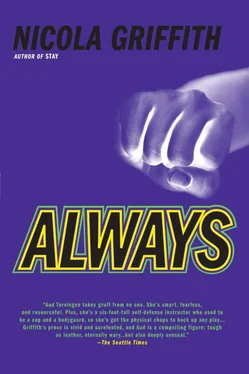I didn’t know what to say.
“What do you know about my accident?”
“That it was a miracle you survived.”
“I didn’t make any mistakes.”
“No.”
“I didn’t make any mistakes,” she said again. She lifted her hand, studied it, flexed it, held it out, palm up, a few inches from the table, as though it were the top of a cliff a hundred feet from the sea. “Everything was perfect: setup, departure point, landing area, wind, temperature, light, cameras. I felt good. The rehearsal had been clean and easy. It was going to be beautiful. I knew it. I felt it. I jumped. I ran and bent, and my muscles compressed like a spring before it flies loose, and I leapt, and the muscles in my right leg just… The spring just broke. There was nothing there.” Her hand rose and turned and fell slowly, inevitably to the table, palm down. “Nothing there.”
I picked it up. “You are here. Your hand is here. Right here. I’m here.”
“Yes,” she said. “But for how long?” She stood, and patted my cheek, as she would a child’s, and filled the kettle.
BY SEVEN O’CLOCKthe temperature in the house had climbed to eighty degrees. Kick turned pale, and when she talked, she slurred very slightly, and I said, What’s the matter? and she said, I’m hot.
I ran a cool bath and laved her with water until her skin began to pebble and her waxy pallor warmed back to gold.
A neurologist. Heat reduced conductivity, and the central nervous system was one electrical system. Increase heat, reduce signal.
“Kick, why don’t you have air-conditioning?”
“Because people in Seattle don’t. Why spend ten thousand dollars for a system you’d only use ten times a year?”
“It’s just money.”
“Just money I don’t have.”
“I do.”
“I know.”
I couldn’t find a fan, so she stayed in the bath while I opened all the windows. I checked the weather forecast for tomorrow: cooler in the morning, hot again from the late afternoon.
By nine o’clock cool air was moving in blocks through the house. I lay awake a long time, coming up with cooling strategies if she couldn’t move, or couldn’t breathe.
IT WASeight o’clock when I woke. She was sitting on the side of the bed, stroking my head with cool hands, staring into the middle distance, lovely and strong and fine as a Chinese chair.
I wasn’t conscious of moving, but her hands must have felt some message from my body, and she blinked and looked at me, and smiled.
She smoothed the hair back from my forehead. “When you’re a bit more awake I want to ask you a favor.”
“I’m awake.”
“What are you doing this afternoon?”
“Nothing I can’t postpone or bring forward to this morning.”
“My five-year-old nephew is coming over around two o’clock. His mom is supposed to be picking him up again around four, but she’s not always great with timekeeping, and I have a message that they want me to go in for another scan at four-thirty.”
“I’ll come with you.”
“No. It’s nothing. Just an hour or so. And Maureen should be here to pick him up before I leave. But I want you to be here to watch him for me in case she’s late. Will you do that?”
“A five-year-old? Couldn’t you just tell Maureen you have a—” Of course. She hadn’t told Maureen anything about this. “Yes,” I said. “I’d be happy to.”
I CALLEDTurtledove from the car before I set off and left a message. He called me back when I was on the bridge over Lake Union. I couldn’t pull over. “Make it fast.” Traffic was light, but anyone who thought it was possible to talk and pay attention to the road at the same time was a fool.
“Bingley’s in Oaxaca.”
“He ran?”
“For a while. It’s a last-minute package deal. He’s back in six days.”
Six days. I’d be on my way back to Atlanta by then.
“If you want to spend the money we could bring him back.”
“No. Leave it.”
I rang off. Then I was off the bridge. I pulled over and called Gary. “This afternoon’s appointments with the banks and Finkel and Rusen’s attorney—see if you can bring them forward to this morning. I have to be done by one-thirty.” To babysit.
“On it,” he said.
He called back as I was giving my keys to the Fairmont valet. “Ten-thirty, Nguyen the banker. Eleven-fifteen, a preliminary meeting with Brooks-Page, the representative of Contalmis, the company that owns one of those Duwamish lots you want. Twelve noon, Clinch, another banker. No response as yet from the attorneys or their principals.” He sounded pleased and terrified.
“Keep trying.”
“Okay. I’ve e-mailed your schedule, and a packet of relevant information is being faxed to your hotel as we speak.”
I could get used to having an assistant.
The fax was waiting when I got to my room, along with one from Bette, together with a cover note in her huge scrawl. Here’s the revised Hippoworks contract. What were they thinking?? They got money, you got bubkes. Thanks to me, you now have some control. Buy me mojitos when you return. I sighed. I didn’t want control. I just wanted to help Kick.
I showered and changed. Checked my e-mail. My schedule, as Gary had promised, and an e-mail from Laurence. Money’s there, everything you asked for, but I hope you know what the hell you’re doing.
I had a few minutes to search the Web for neurological signs and symptoms. A seemingly endless list, from acid maltase deficiency to Zellweger syndrome. I tried again. Leg weakness and MRI. A much smaller list. Brain or spine tumor—but she’d said it wasn’t cancer. Parkinson’s and multiple sclerosis. Guillain-Barré and Huntington’s disease. Brown-Sequard and ALS. Still too many, and all of them frightening.
While I changed my clothes and tried to think about something else, my brain, in orderly fashion, began to construct a hierarchy of disease. The best diagnosis would be a discrete, benign, operable spine tumor. Two hours under the knife and everything fixed. The worst would be ALS, or maybe Huntington’s—a complete dismantling of self not unlike Alzheimer’s. Guillain-Barré was a mixed choice; it generally killed you within nine months or went away on its own.
I had known her only two weeks. I had known Julia six weeks before she died. With Julia, I’d had no warning. And no choice.
THE NEPHEW’Sname was David. "Not Dave,” he said through his tiny milk teeth, “David.” It reminded me of meeting Luz for the first time, though she had been nine, and she hadn’t been clutching a moose backpack stuffed with a Nerf gun—he called it his Pop Shotz Pistol—and three G-rated DVDs.
“Jesus,” Kick said after we’d settled him down in front of the TV with the first one and were making a late lunch in the kitchen, “what is it with these movies? Why does the parent fish or lion or deer always get brutalized in the first few minutes while the fishlet or cub or fawn watches? Jesus. And why does his mother think I need audiovisual aids to keep my nephew entertained for a couple of hours?” I didn’t say anything. It wasn’t the films she was tense about. “Look, can you watch him while I finish this?”
I left her to it and settled down with David in front of the TV, which was showing brightly colored fish.
I looked at David’s gun. It looked as though it worked by squeezing the butt and forcing the Nerf missiles, which were spongy quarrels with suction-cup tips, out of the muzzle with air pressure.
I swapped the gun to my other hand. It was nicely designed, one quarrel already in the barrel and three slotted into a kind of cartridge underneath. It fit my palm well. There was even a sight midway down.
Читать дальше












